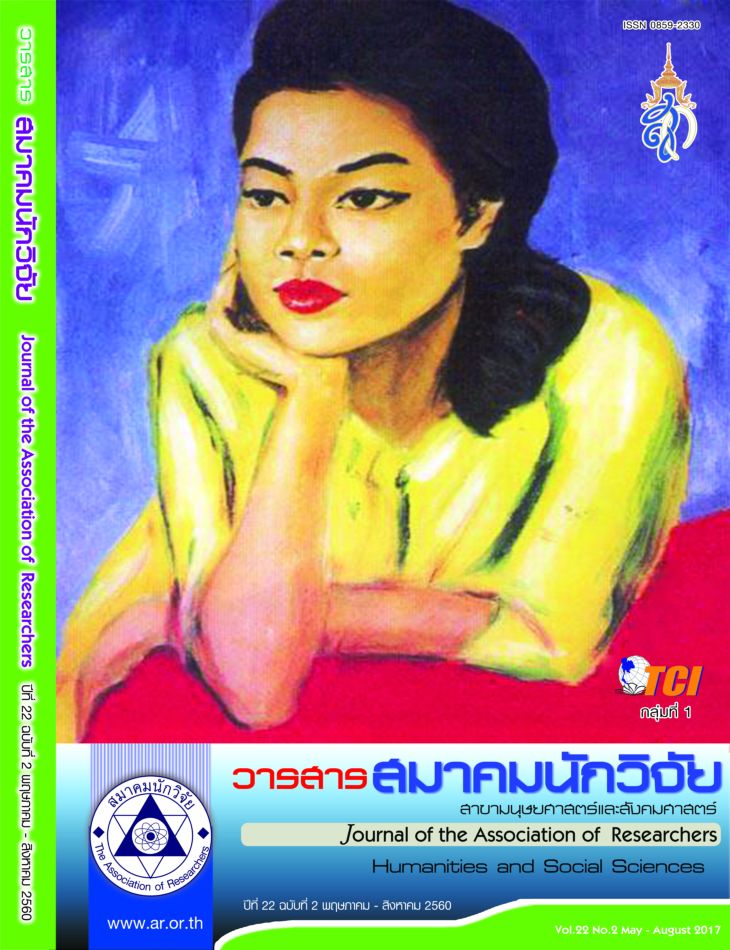Development of Guidelines to Promote Proactive Behaviors in Chon Buri Aluminium Packaging Factory Employees: Mixed Method Research
Main Article Content
Abstract
The purposes of this research were to develop and validate a proactive behaviors measurement model, and to develop guidelines for promoting proactive behavior in Chon Buri aluminium packaging factory employees using a mixed method research paradigm. The research included (1) Quantitative research: the sample was derived by a proportionate stratified random sampling, consisting of 456 participants from packaging factory employees in Chon Buri. The research instrument was a five-level rating scale questionnaire. The consistence of the hypothetical model was validated with second-order confirmatory factor analysis using the Mplus program, (2) Qualitative research: a sample was derived by using purposive selection sampling, and consisted of 12 experts. The research instrument was a semi-structure interview form, was analyzed and concluded with content analysis. The results were as follows: (1) The developed model was consistent with empirical data. (Goodness of fit statistics were Chi-square test (χ2) = 634.290, df = 589, p = .096, TLI = .993, CFI = .995, SRMR = .032,
RMSEA = .013 and relative chi-square (χ2/df) =1.077), (2) The developed proactive behaviors measurement model of Chon Buri aluminium packaging factory employees indicated that the proactive behaviors of employees consisted of four factors: Personal Initiative, Preemptive Personality, Taking Charge, and Role Breadth Self–Efficacy, (3) The guidelines for promoting proactive behavior in Chon Buri aluminium packaging factory employees should proceed in three phases, that is, 1) adjusting the attitude of the employee to be open-minded and positive thinking, 2) allowing employees to express their opinions and
to improve the way of work, and 3) motivating them into developing a proactive behavior. In conclusion, the development of guidelines to promote proactive behaviors in Chon Buri aluminium packaging factory employees should primarily focus on adjustment the attitude of the employee to be open-mined and positive thinking.
Article Details
บทความที่ปรากฏในวารสารนี้ เป็นความรับผิดชอบของผู้เขียน ซึ่งสมาคมนักวิจัยไม่จำเป็นต้องเห็นด้วยเสมอไป การนำเสนอผลงานวิจัยและบทความในวารสารนี้ไปเผยแพร่สามารถกระทำได้ โดยระบุแหล่งอ้างอิงจาก "วารสารสมาคมนักวิจัย"
References
ชไมพร กาญจนกิจสกุล. (2555). ระเบียบวิธีวิจัยทางสังคมศาสตร์. ตาก: บริษัทโพรเจ็คท์ ไฟฟ์-โฟว์ จำกัด.
ณัฐพัชญ์ วงษ์เหรียญทอง. (2557, 26 พฤศจิกายน). 5 นิสัยแย่ในการทำงานที่จะตัดความก้าวหน้าของคุณ.วันที่ค้นข้อมูล 31 มกราคม 2559, เข้าถึงได้จาก http://www.nuttaputch.com/5-bad-working-behavior/
บุญธรรม กิจปรีดาบริสุทธิ์. (2547). ระเบียบวิธีวิจัยทางสังคมศาสตร์. กรุงเทพมหานคร: จามจุรีโปรดักท์. บริษัท แอดวานซ์ อินโฟเซอร์วิส จำกัด (มหาชน).
ปาริฉัตร ตู้ดำ. (2556). ปัจจัยที่ส่งผลต่อความก้าวหน้าในอาชีพของผู้บริหารสตรีในองค์กรภาครัฐ: การทบทวนวรรณกรรม.วารสารนักบริหาร, 33(3), 25-32.
ภัทราวดี มากมี. (2559). การพัฒนาโมเดลการวัดประสิทธิผลองค์การภาครัฐในเขตอาเซียน: การวิเคราะห์โมเดลสมการโครงสร้างพหุระดับ. วารสารสมาคมนักวิจัย, 21(1). 34-48.
References
Covey, S. R. (2004). The 7 habits of highly effective people: Restoring the characteristic. New York:Fireside.
Crant, J. M. (2000). Proactive behavior in organizations. Journal of Management, 26(3), 435–462.
Edmonds, W. A., & Kennedy, T. D. (2017). An Applied Reference Guide to Research Designs Quantitative,Qualitative, and Mixed Methods (2nd ed.). Thousand Oaks, CA: Sage.
Hair, J. F., Black, W. C., Babin, B. J., Anderson, R. E., & Tatham, R. L. (2010). Multivariate data analysis (7th ed.). Uppersaddle River, New Jersey: Pearson Education International.
Hooper, D., Coughlan, J., & Mullen, M. (2008-01-01). Structural Equation Modelling: Guidelines for Determining Model Fit. Electronic Journal of Business Research Methods, 6(1), 53-60.
Yamane, T. (1973). Statistics: An Introductory Analysis. 3rd ed. Tokyo: Harper.
Jaroenruen C., Makmee P., Kornpetpanee S. (2013). Proactive Behavior of Sub-District Muncipality Officcers In Chon Buri Province: A Confirmatory Factor Analysis. Research Methodology and Cognitive Science, 11(1), 56-66. (in Thai).
Karnchanakitsakul Chamaiporn. (2012). Research Methodology in Social Science. Tak: Five-Fove Co.,Ltd. (in Thai).
Wongreanthong Nattaputch. (2014, 26 November). 5 Bad habits for work to break your progress. Date of search data 31 January 2016, Accessible from http://www.nuttaputch.com. /5-bad-workingbehavior/. (in Thai).
Kitpreedaborisut Boontham. (2004). Social Sciences Research Methodology. Bangkok: Jamjuri Product. Advanced Info Srevice Public Company Limited. (in Thai)
.


